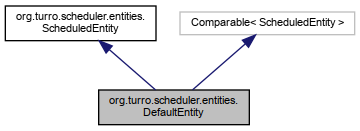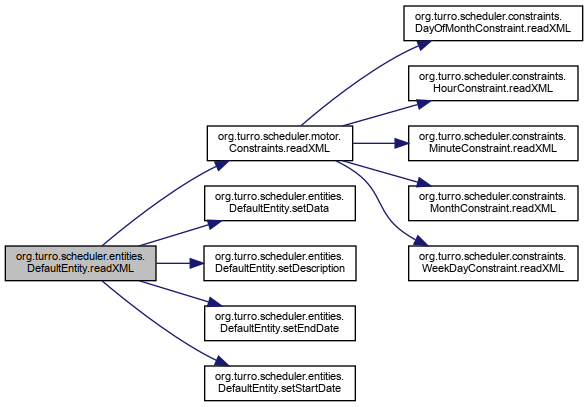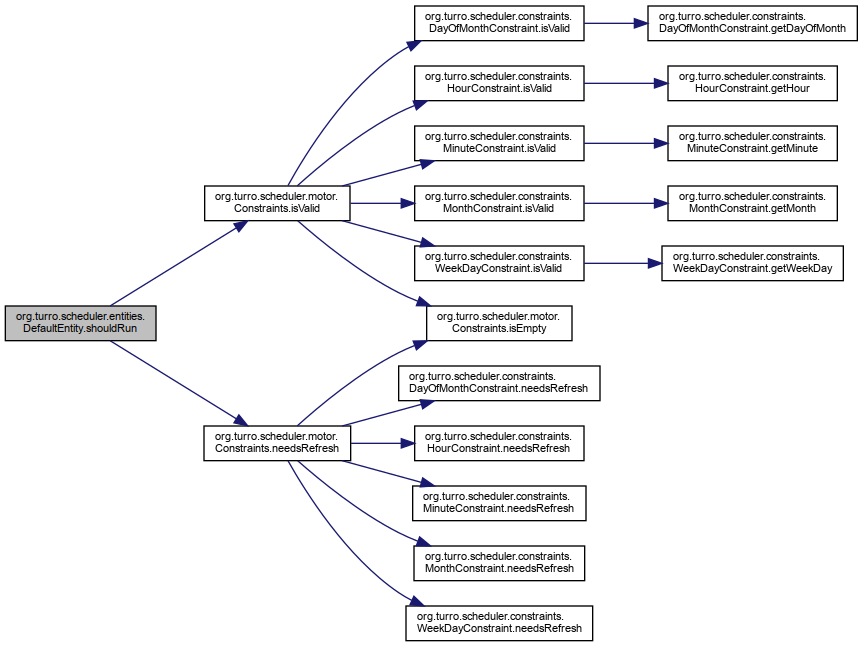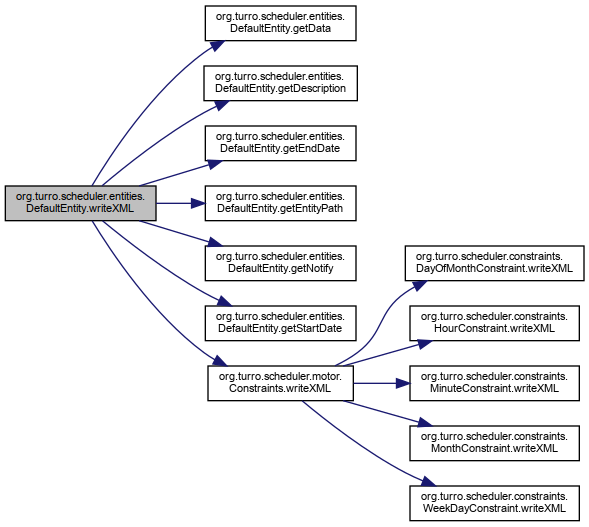

Public Member Functions | |
| DefaultEntity (String entityPath) | |
| boolean | isActive () |
| void | setActive (boolean active) |
| Constraints | getConstraints () |
| String | getData () |
| void | setData (String data) |
| String | getDescription () |
| void | setDescription (String value) |
| Date | getEndDate () |
| void | setEndDate (Date endDate) |
| String | getEntityPath () |
| void | setEntityPath (String value) |
| Date | getStartDate () |
| void | setStartDate (Date startDate) |
| String | getNotify () |
| void | setNotify (String value) |
| boolean | shouldRun (Date now) |
| Object | doRun (IConstructor constructor, Date now) |
| void | readXML (Element root) |
| void | writeXML (Element root) |
| int | compareTo (ScheduledEntity o) |
| boolean | equals (Object obj) |
| int | hashCode () |
Definition at line 33 of file DefaultEntity.java.
| org.turro.scheduler.entities.DefaultEntity.DefaultEntity | ( | String | entityPath | ) |
| int org.turro.scheduler.entities.DefaultEntity.compareTo | ( | ScheduledEntity | o | ) |
| Object org.turro.scheduler.entities.DefaultEntity.doRun | ( | IConstructor | constructor, |
| Date | now | ||
| ) |
Implements org.turro.scheduler.entities.ScheduledEntity.
Definition at line 128 of file DefaultEntity.java.

| boolean org.turro.scheduler.entities.DefaultEntity.equals | ( | Object | obj | ) |
Definition at line 175 of file DefaultEntity.java.

| Constraints org.turro.scheduler.entities.DefaultEntity.getConstraints | ( | ) |
Definition at line 54 of file DefaultEntity.java.
| String org.turro.scheduler.entities.DefaultEntity.getData | ( | ) |
Implements org.turro.scheduler.entities.ScheduledEntity.
Definition at line 59 of file DefaultEntity.java.

| String org.turro.scheduler.entities.DefaultEntity.getDescription | ( | ) |
Implements org.turro.scheduler.entities.ScheduledEntity.
Definition at line 69 of file DefaultEntity.java.

| Date org.turro.scheduler.entities.DefaultEntity.getEndDate | ( | ) |
Implements org.turro.scheduler.entities.ScheduledEntity.
Definition at line 79 of file DefaultEntity.java.

| String org.turro.scheduler.entities.DefaultEntity.getEntityPath | ( | ) |
Implements org.turro.scheduler.entities.ScheduledEntity.
Definition at line 89 of file DefaultEntity.java.

| String org.turro.scheduler.entities.DefaultEntity.getNotify | ( | ) |
Implements org.turro.scheduler.entities.ScheduledEntity.
Definition at line 108 of file DefaultEntity.java.

| Date org.turro.scheduler.entities.DefaultEntity.getStartDate | ( | ) |
Implements org.turro.scheduler.entities.ScheduledEntity.
Definition at line 98 of file DefaultEntity.java.

| int org.turro.scheduler.entities.DefaultEntity.hashCode | ( | ) |
Definition at line 190 of file DefaultEntity.java.
| boolean org.turro.scheduler.entities.DefaultEntity.isActive | ( | ) |
Implements org.turro.scheduler.entities.ScheduledEntity.
Definition at line 45 of file DefaultEntity.java.
| void org.turro.scheduler.entities.DefaultEntity.readXML | ( | Element | root | ) |
Implements org.turro.scheduler.entities.ScheduledEntity.
Definition at line 138 of file DefaultEntity.java.

| void org.turro.scheduler.entities.DefaultEntity.setActive | ( | boolean | active | ) |
Implements org.turro.scheduler.entities.ScheduledEntity.
Definition at line 50 of file DefaultEntity.java.
| void org.turro.scheduler.entities.DefaultEntity.setData | ( | String | data | ) |
Implements org.turro.scheduler.entities.ScheduledEntity.
Definition at line 64 of file DefaultEntity.java.

| void org.turro.scheduler.entities.DefaultEntity.setDescription | ( | String | value | ) |
Implements org.turro.scheduler.entities.ScheduledEntity.
Definition at line 74 of file DefaultEntity.java.

| void org.turro.scheduler.entities.DefaultEntity.setEndDate | ( | Date | endDate | ) |
Implements org.turro.scheduler.entities.ScheduledEntity.
Definition at line 84 of file DefaultEntity.java.

| void org.turro.scheduler.entities.DefaultEntity.setEntityPath | ( | String | value | ) |
Definition at line 93 of file DefaultEntity.java.
| void org.turro.scheduler.entities.DefaultEntity.setNotify | ( | String | value | ) |
Implements org.turro.scheduler.entities.ScheduledEntity.
Definition at line 113 of file DefaultEntity.java.
| void org.turro.scheduler.entities.DefaultEntity.setStartDate | ( | Date | startDate | ) |
Implements org.turro.scheduler.entities.ScheduledEntity.
Definition at line 103 of file DefaultEntity.java.

| boolean org.turro.scheduler.entities.DefaultEntity.shouldRun | ( | Date | now | ) |
Implements org.turro.scheduler.entities.ScheduledEntity.
Definition at line 118 of file DefaultEntity.java.

| void org.turro.scheduler.entities.DefaultEntity.writeXML | ( | Element | root | ) |
Implements org.turro.scheduler.entities.ScheduledEntity.
Definition at line 156 of file DefaultEntity.java.
